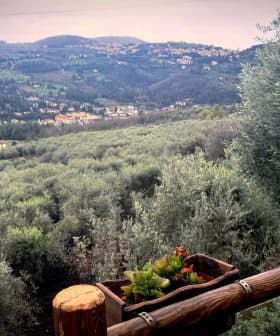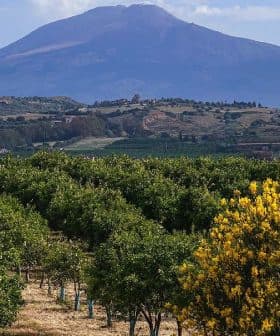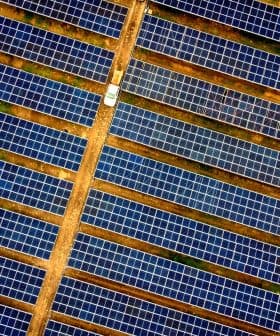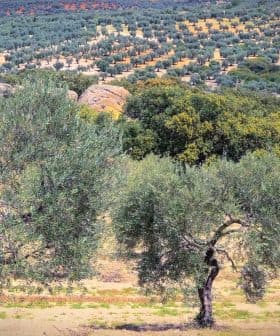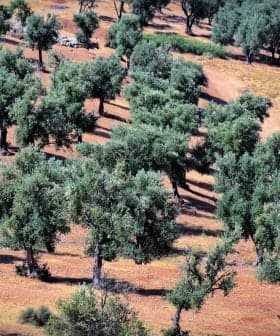Tunisian Olive Oil Producers Thrive Despite Political Turmoil
While one of the world’s largest olive-producing nations undergoes shifts that worry international observers, olive growers are more concerned about climate change.
Tunisian President Kais Saied’s recent power consolidation measures are expected to have significant consequences, but local olive oil producers and experts do not anticipate an impact on the olive oil sector, which remains strong with 240,000 tons of olive oil expected for the 2021/22 crop year. Despite political uncertainty, concerns about climate change and market prices, Tunisian producers are optimistic about the future of high-quality olive oil production and are focusing on international recognition and health benefits to strengthen their position in the market.
The extraordinary measures introduced in recent months by Tunisian President Kais Saied to concentrate the power of his own office will bear far-reaching consequences.
Still, local olive oil producers and political experts do not believe that what is happening will impact the olive oil sector.
Unless things spiral out of control and Tunisia faces massive instability, it seems that the agricultural sector should remain as it is.
With 240,000 tons of olive oil expected for the 2021/22 crop year, Tunisia will remain among the world’s largest olive oil-producing countries. Over the past two decades, the sector has been fueled by large investments and steadily rising rates of global olive oil consumption.
See Also:2021 Harvest UpdatesAccording to Ministry of Agriculture data, Tunisia expects to export at least 180,000 tons of olive oil in 2021/22. The current crop year opened right after Saied froze the country’s parliament, fired the prime minister and announced that he would govern the country by decree.
His office clarified that the constitution will remain largely intact, but any provision limiting the power of the president is no longer in force. At the end of September, Saied nominated a new prime minister and a new government has been formed.
While political instability and uncertainty about the future of the North African democracy could impact an essential piece of the country’s olive oil economy – exports and international trade relations – experts say that is not yet the case.
“While Saied’s support amongst the political elite, such as political parties and large civil society groups, is waning, public support for his actions remains high,” Sarah Yerkes, a senior fellow at the Carnegie Endowment for International Peace’s Middle East program, told Olive Oil Times.
“This is largely because many Tunisians are fed up with the traditional political actors and have not seen any improvement to their daily lives in the decade since the revolution,” she added. “Many of them see Saied as someone who is trying to give Tunisia a fresh start and hold those accountable who have failed to address Tunisia’s challenges.”
“However, Saied has not shown that he has any real or effective plan to address the economic, social or political problems currently facing the country,” Yerkes continued. “And with all of the power concentrated in his hands, he will have no one to blame if he is unable to deliver.”
Appeals have been directed to Saied by several international observers to reinstate the parliament and return power to elected officials. In the last few days, more than 30 local human rights advocates asked Saied in an open letter to set a time limit for his extraordinary measures.
They denounced a climate of hatred and repression, which they believe is the true reason behind the arrest of the former Agriculture Minister Samir Bettaieb on charges of corruption.
At the same time, International Olive Council (IOC) executives recently met with their Tunisian counterparts in the capital, Tunis, which confirmed the normalization of Tunisia’s international relations.
The IOC meeting with current Agriculture Minister Mahmoud Elias Hamza focused on the development of international cooperation both in the training of local experts and in the country’s participation in the IOC’s next international meetings. Tunisia was also confirmed as the guest of honor for Expoliva 2023.
Despite the political uncertainty, producers in the country told Olive Oil Times that the biggest threat they continue to face is climate change.
“The new season promises to be average in terms of olive oil volumes, given the drought and the water scarcity,” said Salah Ben Ayed, the owner of Domaine Adonis, which earned two Gold Awards at the 2021 NYIOOC World Olive Oil Competition.
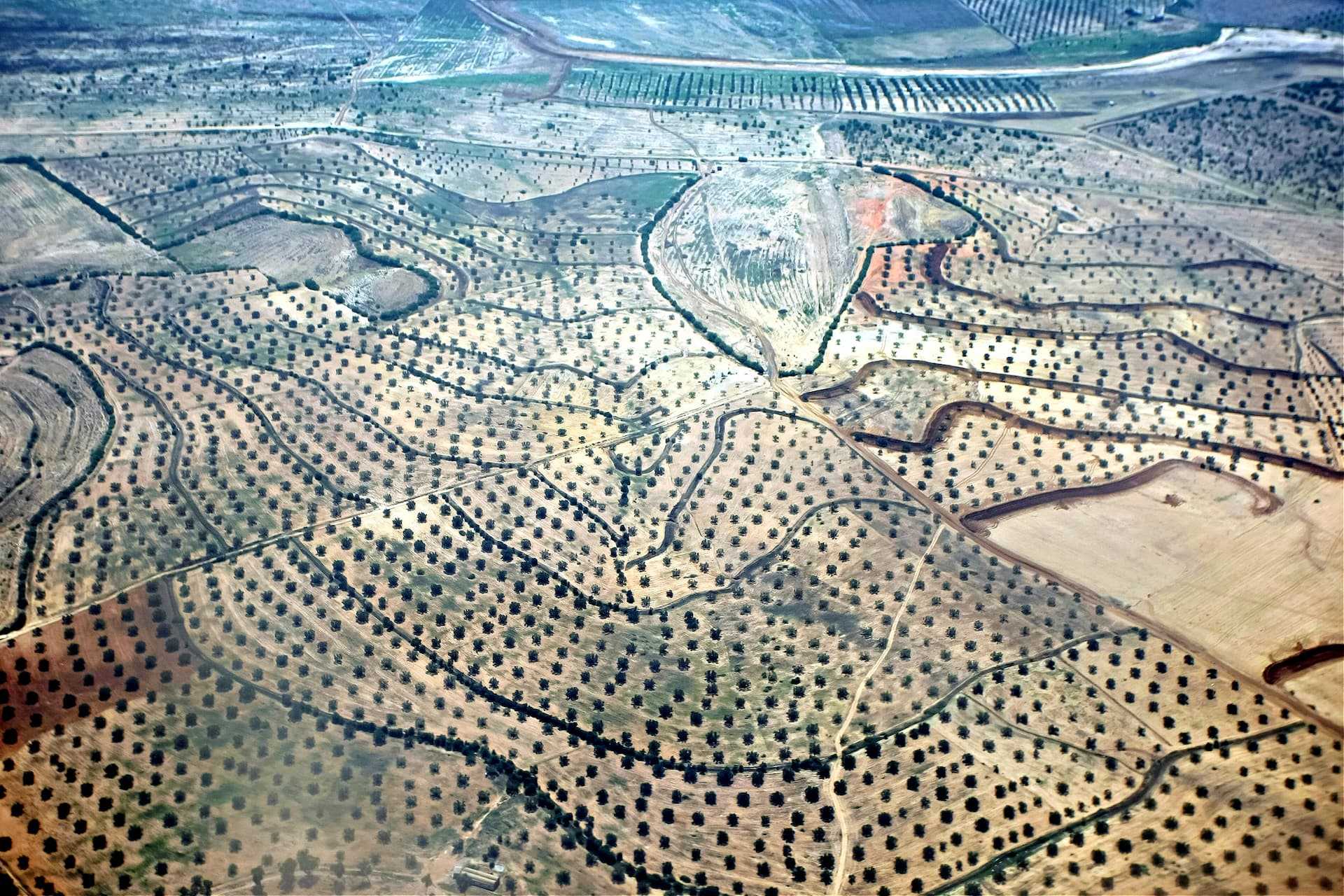
Aerial view of an olive plantation in Tunisia
“As a matter of fact, climate change is increasingly felt over time because of the hot weather and the lack of rainfall,” he told Olive Oil Times.
“Weather was harsh lately. We had a very hot summer this year with hardly any rain, which put a lot of stress on our trees,” added Karim Fitouri, the founder of Olivko, whose extra virgin olive oils also earned awards at the 2021 NYIOOC.
“Still, we understood from history and from nature that olive trees are survivors,” he told Olive Oil Times. “During several thousand years, the olive tree managed to stay strong through a lot of disasters.”
See Also:U.K. Drops Tariffs on Tunisian Olive Oil Imports After Signing Trade DealAlong with concerns about the climate, Ben Ayed explained that local producers’ other worries come from low market prices for olive oil and the fact that its health benefits are not yet well-known in Tunisia and underappreciated abroad.
“If we look at the future of high-quality olive oil production in Tunisia, we can be optimistic, given the demand growth experienced during the Covid-19 pandemic,” he said. “Yet, many consumers do not differentiate different qualities of olive oil.”
According to Fitouri, one of the ways in which Tunisian producers have strengthened their position in both the domestic and international market is through winning awards at international competitions. Consumers, he added, will follow.
“Covid-19 has sped up the process of public health awareness,” Fitouri said. “If a few years ago one would have asked the general public what the immune system is, only a few would have been able to answer.”
“But now that is changing,” he added. “People now know they need good quality food and they began understanding the benefits extra virgin olive oil provides.”
Recently the European Bank for reconstruction and development (EBRD) confirmed funding for several projects to sustain the development of the olive oil sector in Tunisia.
See Also:The Best Olive Oils from TunisiaSince 2012, EBRD has awarded €6.2 million in loans to foster export competitiveness and the country’s economic growth. In this scenario, the olive oil sector plays a pivotal role. Some of the latest funds will specifically sustain olive oil production, bottling and exports.
“I don’t think agriculture will suffer,” Yerkes said. “So far, Europe and the United States have been relatively muted in their responses to Saied and assistance continues to flow with relations largely normalized.”
“Unless things spiral out of control and Tunisia faces massive instability, it seems that the agricultural sector should remain as it is,” she added.
The European Union is far and away Tunisia’s largest olive oil customer. According to the Tunisian National Olive Oil Board, roughly 80 percent of all exports are shipped to the E.U., with a growing market share in the United States and Canada.
“Tunisia is now on the right path to becoming one of the leaders of high-quality extra virgin olive oil production,” Fitouri concluded. “Our dry climate and our perfect soil make our country the ideal home for the olive trees.”
Share this article


